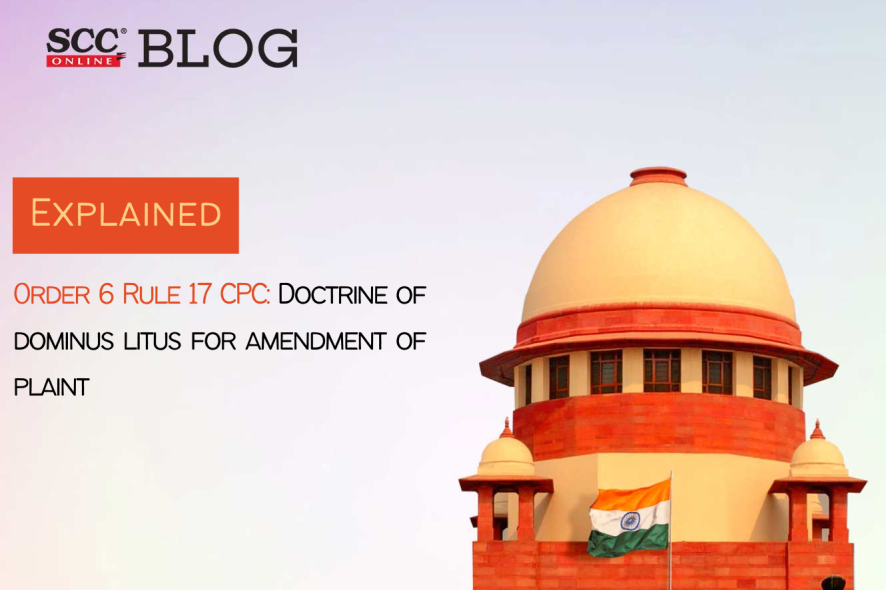Supreme Court: The Division Bench of M.R. Shah* and B.V. Nagarathna, JJ., explained the legal propositions governing Order 6 Rule 17 and Order 1 Rule 10 of the Civil Procedure Code for amendment of the plaint.
Reversing the impugned order of the Delhi High Court, the Court stated that the High Court while allowing the amendment application had not properly appreciated the fact that by granting such an amendment and permitting plaintiffs to amend the plaints incorporating the prayer clause to declare the respective charges/mortgages void ab-initio, the nature of the suits will be changed.
Chronology of Events
The Asian Hotels (North) Ltd. (appellant herein) had granted licenses for individual shops to various shopkeepers including the respondent-original plaintiff from 1983 onwards. The genesis of the appeal relates to the revocation of license notice served on the licensees by the appellant** licensor. Aggrieved thereby, the respondent instituted suits before the Delhi High Court against the appellant seeking a decree of declaration that the license in favour of the respondent in respect of shop/premises is irrevocable and perpetual and the purported revocation of the License is illegal, void and bad in the eyes of law.
A decree was also sought for a declaration that the respondent has the unfettered right to occupy and use the said premises/shop under the irrevocable license till the documents of transfer/conveyance are executed by the appellant.
During the pendency of the suit, the respondent approached the Court with an application under Order 6 Rule 17 of the Civil Procedure Code (the Code), seeking an amendment of the plaint to challenge various mortgages created by the appellant hotel, in favour of certain banks. The respondent contended that the mortgages in favour of the Financial Institutions/Banks are illegal and void ab-initio to the extent it encumbers any right, title, and interest of the respondent in the subject premises. Similarly, another application under Order 1 Rule 10 of the Code was also filed by the respondent under Order 1 Rule 10 of the CPC seeking to implead the Banks and the Financial Institutions as defendants nos. 2 to 7.
By the impugned order in Alok Kumar Lodha v. Asian Hotels (North) Ltd., 2021 SCC OnLine Del 4370, the High Court allowed both the applications filed under Order 6 Rule 17 and Order 1 Rule 10 of the Code by relying on Kasturi v. Iyyamperumal, (2005) 6 SCC 733.
Observations and Findings
The Court observed the following to hold that the respondent/original plaintiffs being the licensee were aware that there shall be charges/mortgages on the entire premises and the buildings including the shops:
-
The mortgages have been created in favour of different mortgage banks/financial institutions from 1982 onwards which have been extended and/or rolled over, refinanced, and replaced from time to time. At that time, none of the original plaintiffs (including the respondent) were license holders.
-
The mortgages are created not only with respect to the shops/premises occupied by the original plaintiffs but with respect to the entire premise/Hyatt Residency Hotel. The respective original plaintiffs are granted licenses for individual shops which are part of the entire premises.
-
Even under the License Agreement (clause 13) the Licensor shall have the right to create charges/mortgages as and by way of the first charge on its land, premises, and the buildings (including shops) constructed and to be constructed in favour of financial institutions and banks as security for their terms loan advanced/to be advanced to the licensor for the completion of its hotel project.
-
The alleged rights of the plaintiffs as perpetual license holders are yet to be adjudicated upon. The licenses of the original plaintiffs have been revoked. Therefore, in a suit challenging revocation of the respective licenses, the plaintiffs cannot be permitted to challenge the respective mortgages/charges created on the entire premises as void ab-initio.
Hence, the Court held that now after a number of years, plaintiffs could not be permitted to challenge the mortgages/charges created on the entire premises including shops. The Court noted that the High Court while allowing the amendment application had not properly appreciated the fact that by granting such an amendment and permitting plaintiffs to amend the plaints incorporating the prayer clause to declare the respective charges/mortgages void ab-initio, the nature of the suits will be changed.
Emphasising on the settled proposition of law, the Court stated if, by permitting plaintiffs to amend the plaint including a prayer clause nature of the suit is likely to be changed, in that case, the Court would not be justified in allowing the amendment. It would also result in a misjoinder of causes of action.
Doctrine of Dominus Litus
On noting that the High Court had placed heavy reliance on the doctrine of dominus litus to allow the application, the Court clarified that the principle that the plaintiffs is the dominus litus shall be applicable only in a case where parties sought to be added as defendants are necessary and/or proper parties. The plaintiffs cannot be permitted to join any party as a defendant who may not be necessary and/or proper parties at all on the ground that they are the dominus litus.
Conclusion
Considering the above, the Court allowed the instant appeal. The impugned order was quashed for being unsustainable, both on facts as well as on law.
[Asian Hotels (North) Ltd. v. Alok Kumar Lodha, (2022) 8 SCC 145, decided on 12-07-2022]
*Judgment by: Justice M R Shah
**Judgment appears to have mistakenly stated the original plaintiff as licensor instead of the appellant (refer to para 3.1).
Advocates who appeared in this case:
Mukul Rohatgi, Senior Advocate, for the Appellant;
Avishkar Singhvi and Rahul Gupta, Advocates, for the Respondents.
∗Kamini Sharma, Editorial Assistant has put this report together.







